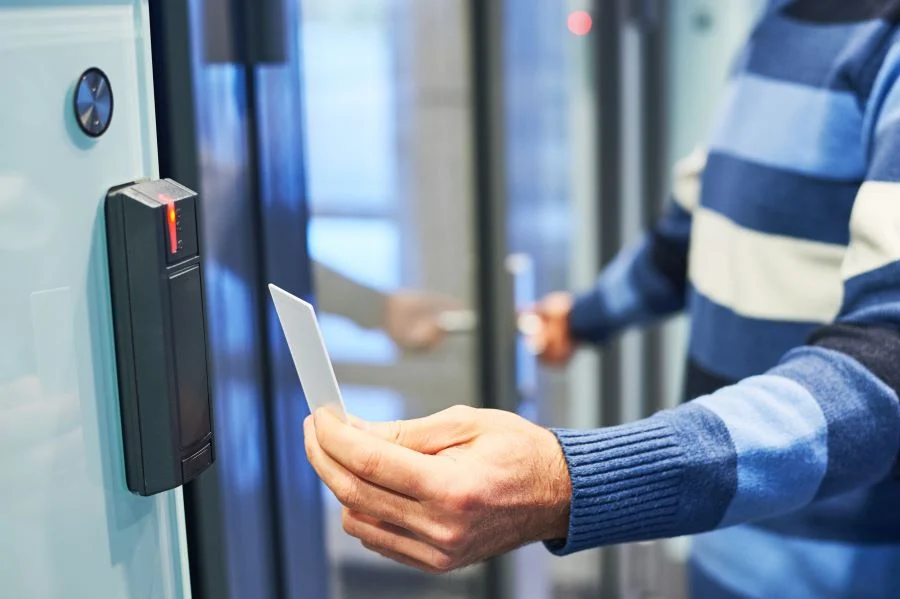Key fobs have become an integral part of modern business operations, revolutionizing the way companies manage access to their buildings and secure areas.
These small, portable devices streamline employee entry, enhance security, and provide a convenient solution for both employers and employees. In an age where technology plays an increasingly vital role in business infrastructure, key fobs offer a range of benefits that go beyond simple entry control. Here’s how key fobs are transforming modern business environments.
1. Improved Security and Access Control
One of the most significant advantages of key fobs is the enhanced security they provide. Unlike traditional keys, which can be easily duplicated or lost, key fobs are often equipped with encryption technology, making them more difficult to hack or clone. This makes it much harder for unauthorized individuals to gain access to secure areas within a building.

Key fobs from companies like doorcontrolsdirect.co.uk are usually linked to an access control system that can be programmed to allow or restrict entry to specific areas, depending on an employee’s role or clearance level. For example, administrative staff may have access to general office areas, while IT personnel can be given access to server rooms. This granular control over access levels adds an extra layer of security, ensuring that sensitive or high-risk areas are only accessible to those who need them.
Additionally, key fob systems can track when and where employees enter and exit a building, creating a detailed log of activity. This can be especially useful in case of a security breach or emergency, as it provides valuable information on who was in the building at a particular time.
2. Convenience and Ease of Use
For both employees and employers, key fobs offer an unparalleled level of convenience. Employees can easily carry key fobs on their keychains or in their pockets, allowing for quick and seamless entry to the building. This is particularly advantageous in fast-paced environments where employees are frequently entering and exiting various areas of the workplace.
Key fobs can also be used to grant temporary access to visitors, contractors, or part-time employees. With traditional keys, this would often require issuing and retrieving physical keys, which is time-consuming and can be difficult to manage. Key fobs, however, can be activated or deactivated remotely, making it easy to provide temporary access without needing physical handovers. This flexibility is ideal for businesses that frequently host clients, contractors, or external teams.
3. Efficiency in Managing Employee Access

Key fobs streamline the management of employee access by offering a centralized system that can be easily monitored and updated. Traditional locks require physical changes or keys to be reissued whenever there is a security concern or employee turnover.
In contrast, key fob systems allow for immediate updates to access permissions through software. If an employee loses their key fob or leaves the company, it can be deactivated within seconds, eliminating the need for costly lock changes.
For larger companies, key fobs can be integrated with other business systems, such as time and attendance tracking. When employees use their key fobs to enter and exit the building, the system can automatically log their work hours, reducing the need for manual timesheets or punch cards. This not only saves time for HR departments but also improves accuracy in payroll processing.
4. Enhanced Flexibility
Modern key fobs often come equipped with additional functionality beyond simple door access. Some systems integrate with parking garages, elevators, and restricted rooms, allowing employees to use the same device for multiple access points within the building. This reduces the need for separate keys or entry cards, simplifying the process and reducing clutter.
Key fobs can also be customized to grant access based on time restrictions. For instance, cleaning staff may have access only during certain hours, while management might have 24/7 access. This flexibility helps businesses ensure that access is granted appropriately, further enhancing security.
Conclusion
Key fobs are playing an increasingly important role in modern business operations by streamlining access control, enhancing security, and offering flexibility in managing employee entry. Their ability to integrate with other business systems and provide real-time monitoring makes them a valuable asset for businesses of all sizes.
Whether for a small office or a large corporate campus, key fobs offer a practical, efficient, and secure solution for managing entry and ensuring the safety of both employees and assets. As businesses continue to evolve, key fob systems will remain a cornerstone of modern access control strategies.







